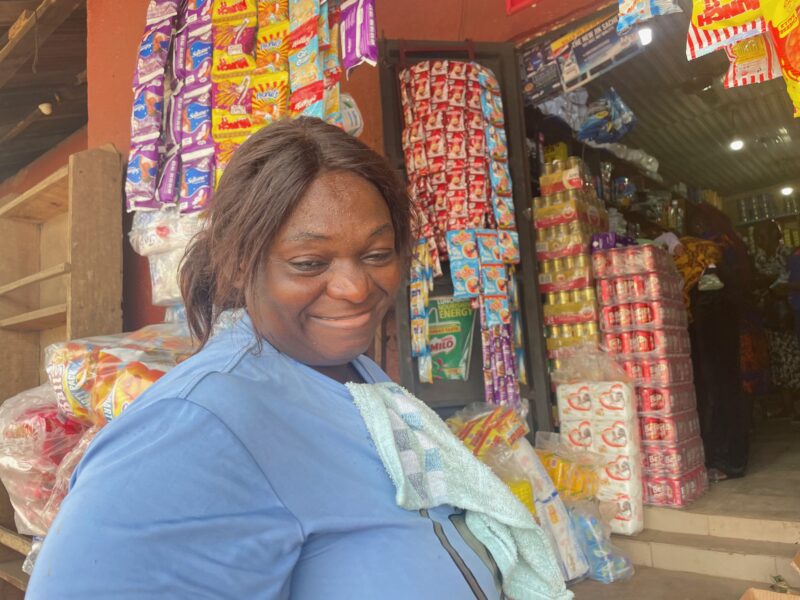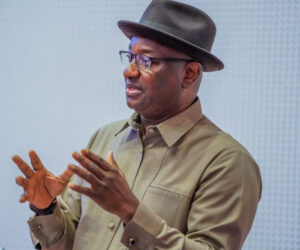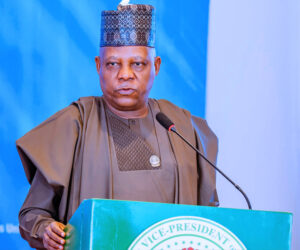In Nigeria’s south-south region, many women carry a heavy burden as mothers who serve as the providers for their families. Behind their resilience lies a quiet struggle that affects the nutritional and emotional well-being of their children.
They often engaged in informal work and, faced with limited financial support, stretched meagre earnings to keep their families afloat. But survival comes at a steep price — malnutrition, mental stress, and emotional gaps that ripple across generations.
Joan Ukadike, a petty trader and mother of four from Alihame in Delta State, knows this reality all too well.
The weight of responsibility often extends beyond financial burdens to a quieter, more insidious toll on her health, time, and emotional well-being.
Mrs Ukadike’s days are a relentless cycle of work and caregiving, leaving little room for rest or self-care.
“It tells on the woman because of the health distress. It’s very stressful,” she said, her voice carrying the weariness of years of endurance. “But you do what you have to do to keep the family going. You don’t leave all the responsibility to the men.”
Just like Mrs Ukadike, Magdalene Festus, a petty trader and mother of five who resides in Benin City, spoke about the realities and challenges of her role in the family.
Mrs Festus noted that, as a mother, the responsibility of taking care of the household often falls entirely on her.
“As a mother, it’s not easy. The journey is long, and it requires partnership, but when the support isn’t there, you’re left to bear it all,” she said.
She observed the impact this imbalance has on children. “Nowadays, you see many children with fathers, but they’re like children without fathers. There’s no guidance, no discipline, and no partnership in raising and providing for them.”

Economic realities rewriting family roles in Nigeria
In many African societies, traditional gender roles demand that men serve as the primary providers, while women play the nurturing role and manage household upkeep. The man, viewed as the head of the family, is expected to bear the weight of its well-being, with women positioned as supporters rather than equal contributors. However, this tradition is gradually changing.
Current economic realities and shifting social norms are rewriting these expectations. A significant shift is evident in low-income communities across Africa, where many women have taken on the role of primary breadwinners, sustaining families through trading, farming, and small-scale businesses.
A 2016 survey by the National Bureau of Statistics (NBS) revealed that 21.1 per cent of Nigerian households were female-led, indicating an early shift in traditional family dynamics.
The latest NBS 2023/2024 General Household Survey-Panel Wave 5 shows that female-headed households now account for 22.3 per cent of the total, marking a 1.2 percentage point increase over seven years.
While the South-East zone had the highest percentage of female breadwinners, with 34.4 per cent, the South-South zone had the second highest with 30.8 per cent. The South-West came third with 29.7 per cent, followed by the North-Central with 17.1 per cent, the North-East with 12.1 per cent and the North-West with 10.3 per cent.
The NBS report noted that the South-South region recorded the most dramatic rise, with a 6.9 percentage point increase between Wave 4 and Wave 5, signalling a fundamental shift in who holds the economic reins at home.
Behind these statistics are personal stories of resilience. For women like Mrs Festus, becoming a breadwinner was not by choice but by circumstance. She lost her husband some years ago.
“I have five children, and my last child is 13 years old,” she explained. “We were hoping for a boy before I lost my husband. Now, it’s all on me. Any woman depending solely on a man these days is wasting her time.”
Others, like Mrs Ukadike, share a similar experience. Though her husband is present, she assists in paying the bills, as part of her belief that parental cooperation is essential for family stability.
“The current economic realities require active participation from both parents,” she said, “because unity and cooperation prevent conflicts and create a harmonious environment for the children.”
Silent toll on mothers and child nutrition
For both Mrs Ukadike and Festus, the dual role of being a mother and provider for the household puts a lot of pressure on their lives. The long hours spent juggling work and household responsibilities leave them with little time for their children.
“The time you need to spend with them to study or talk, you find yourself dozing off,” Mrs Ukadike said. Yet, she found ways to reconcile her circumstances, striving to ensure her family remains intact.
For many families, women serving as primary providers have consequences, particularly in nutrition. These women stretch limited resources to meet the needs of their children, often at the expense of proper nourishment.
A nutritionist and health educationist from Benin City, Faith Uwa, said the nutrition and well-being of children are affected when struggling mothers are the breadwinners.
“Nutritionally and health-wise, it affects them negatively,” Ms Uwa explained.
“Let’s say, for instance, a mother has a child between six months and one year. At this stage, they are supposed to be consuming baby-formulated milk like NAN, SMA Gold, or Cerelac. But the woman often cannot afford these,” she said.
“Instead, she resorts to cheaper alternatives like Peak Milk or Cowbell, which are not designed for infants. This can cause malnutrition for the child.”
Additionally, a psychologist and advocate for women, Nnyen Adomi, explained that such women experience psychological strain, characterised by symptoms of burnout, anxiety, and, in many cases, subclinical or clinical depression.
Ms Adomi said combining nurturing and providing roles can lead to emotional depletion, a state where women feel incapable of caring for themselves, let alone for others. This situation, she said, is exacerbated by the invisibility of their labour.
‘’Many women in the South-South work informally, selling goods, providing services, or engaging in agriculture without receiving recognition or adequate compensation for the effort they invest. Societal expectations that women should be natural caregivers further discourage them from seeking help, creating a silence around their distress.’’

Mrs Ukadike’s struggle wasn’t just about meeting financial needs. It was also about maintaining a sense of normalcy for her children and shielding them from the fractures within the family dynamic. She believed in keeping a united front, even when her husband’s contributions fell short.
The cost of malnutrition and financial instability
The impact of these struggles isn’t limited to the mothers. Children in households with overburdened breadwinners may bear lifelong consequences.
A report by the Gates Foundation highlights the long-term effects of childhood hunger, revealing that individuals who experienced hunger as children earn 10 per cent less over their lifetimes and are 33 per cent less likely to escape poverty.
Globally, undernutrition costs an estimated $3 trillion annually in lost productivity, with low-income countries bearing the brunt at three to 16 per cent of GDP.
The Food and Agriculture Organisation (FAO) estimates that approximately 33.1 million Nigerians are projected to face high levels of food insecurity during the 2025 lean season (June–August), up from 26.5 million in 2024.
This, it said, will put approximately 5.4 million children and nearly 800,000 pregnant and breastfeeding women at risk of acute malnutrition.
In September 2024, the National Bureau of Statistics (NBS) in its cost of healthy diet (CoHD) for September 2024 revealed that it cost an average of N1,346 to give a single adult a single healthy diet.
Meanwhile, Edo State ranks 8th in Nigeria for human development, with a Human Development Index (HDI) of 0.633. Its poverty rate is among the lowest in the country—approximately 8.8 per cent of residents live below the $2.15/day threshold. Delta State, with an HDI of 0.607, boasts the lowest poverty rate at 2.9 per cent.
A resident of Ugbague community in Oredo Local Government Area of Edo State, simply identified as Austin, explained his reality as a son single-handedly raised by his mother. He said his life might have taken a different turn if not for the love he got from his mother.
“I am who I am today because of my mother. There were things my father should have done that he didn’t. I loved my mother more because she was the one who provided for me. It’s hard to respect a father who doesn’t take responsibility.”
Mr Austin highlights the societal consequences of a lack of parental responsibility. “The child who is left alone, sometimes even the mother is not able to provide everything for this particular child. What do you expect from such a child?”
He connects this void in parental care to broader societal issues. “A lot of things are happening in society because parental responsibility is lacking in the family.”

This perspective underscores how the failure to meet a child’s emotional and material needs can ripple outward, contributing to cycles of vulnerability, exploitation, and social instability.
Aisha Jimoh was only a child when she realised her mother wasn’t just her caregiver, she was the family’s sole breadwinner. “It was hard for me to understand my own body growing up,” she said, her voice soft but steady.
“My mom was always busy making money for us. I had to rely on friends to learn about things I should have learned from her. Most of the lessons came from bad experiences.”
The consequences of absent paternal figures and overburdened mothers ripple through families, often leading to emotional scars and reduced opportunities for children like Austin and Ms Jimoh, Ms Adomi, the psychologist said.
According to her, the mental health of children in these households is often influenced by both the presence and the pressures stemming from their mother’s dual role.
On one hand, these children may grow up internalising resilience, self-discipline, and responsibility by observing their mothers. On the other hand, they may experience emotional neglect if the caregiving parent is too stretched to provide consistent emotional support.
This dynamic, Ms Adomi said, can lead to what psychologists refer to as parentification, a process where the child takes on responsibilities beyond their developmental capacity, either emotionally or practically. It may, over time, affect their self-worth, attachment patterns, and coping mechanisms as they reach adolescence and adulthood.
According to the psychologist, children do not need perfect mothers; they need emotionally safe environments. She added that when a caregiving-breadwinning mother is supported and validated, the positive effects extend not only to her mental health but also to her children’s developmental outcomes.
Breaking the cycle of poverty
Studies have shown that empowering women financially is critical to breaking the cycles of poverty and malnutrition. Research shows that when women have access to financial resources and decision-making power, they invest more in household nutrition, health, and education.
For Sarah Osazuwa, a mother of seven, the story is one of presence without the expected support.
With her first child now 26 and her youngest only 12, Mrs Osazuwa explained that while her husband lives with the family, he has not been able to shoulder the responsibilities expected of him.
“If the father had enough, there would be no problem. But since he doesn’t, as a woman, you support your husband,” she said, noting how many women have had to step up simply because the men cannot meet the family’s financial needs.
Her frustration also reflects a larger concern about complacency among some men. “They are not serious,” she lamented. “Many of them just depend on money coming from relatives abroad. ‘My sister will send money, my brother will send money.’ So they sit back and wait for that, while the women carry the weight of the home.”
Mrs Osazuwa’s struggles underline the need for systemic change. Limited access to capital and economic opportunities perpetuates the challenges faced by women like her, trapping their families in cycles of hardship.

Financial inclusion, particularly for women, is a proven strategy for fostering household stability and economic growth. Organisations like the World Bank emphasise the importance of microfinance programmes and targeted interventions that provide women with the tools they need to succeed.
Despite the odds, women in South-South Nigeria demonstrate resilience. They navigate societal expectations, economic hardship, and the emotional toll of dual roles with determination.
Mrs Ukadike spoke of the delicate balance she maintained to shield her children from the harsh realities of her struggles. “If the husband isn’t cooperating, the children will know,” she said. “But as a mother, you have to keep the family together. Love and understanding in the home are important, even if you’re the one doing everything.”
This resilience, however, should not excuse systemic neglect. Women like Joan and Sarah need more than admiration; they need tangible support from policymakers, financial institutions, and society at large.
Practical solutions amid hardship
The stories of Mrs Ukadike, Osazuwa and Festus illuminate the hidden burdens carried by South-South Nigeria’s female breadwinners. These women’s sacrifices sustain their families, but at a cost that society can no longer afford to ignore.
Empowering women through access to capital, nutrition education, and policy reforms is not just a moral imperative; it is an economic necessity. By investing in women, we invest in families, communities, and the nation’s future.
While the burden of providing for many families falls heavily on women, practical strategies were provided by the nutritionist, Ms Uwa, to help alleviate the immediate nutritional deficiencies often caused by economic strain.
“If you have a small space, you can start a vegetable garden,” the nutritionist suggested to mothers. She asked them to “Plant veggies like pumpkin leaves or ugu’’ saying they are rich in vitamins and can be used in meals to boost their nutritional value. ‘’If you don’t have money for eggs or crayfish, adding pumpkin leaves to noodles or other simple meals can make a difference.”
She also recommended small-scale businesses as a lifeline for women juggling tight budgets. “From such businesses, you can eat from what you sell and replace it. It’s a way to sustain your family and ensure they get some level of proper nutrition,” she advised.
As Ms Jimoh reflected on her mother’s sacrifices, she offered a poignant reminder: “No child should have to learn life’s lessons the hard way. Mothers like mine deserve help, and children like me deserve better.”
Ms Adomi, the psychologist, stands by her belief that the intersection of caregiving and breadwinning among South-South women is more than just a social reality, a mental health imperative that should be given more attention. “These women navigate systems that are not designed to support them, yet they continue to hold families and communities together, often at great personal cost.’’
READ ALSO: In Akwa Ibom, pregnant women, babies die due to poorly-equipped PHCs while govt wastes billions
She admonished mental health professionals and advocates to follow through with their responsibility of first acknowledging the experiences of these women, while pushing for structural changes that can foster their psychological recovery and well-being.
These, she said, include improving access to culturally relevant mental health services, strengthening community support systems, and advocating for policies that recognise and redistribute the burden of unpaid care work.
By centring the voices and lived experiences of these women, we begin to shift the narrative from survival to dignity, from silence to visibility, and from burnout to healing.
This reporting was completed with the support of the Centre for Journalism Innovation and Development (CJID).












